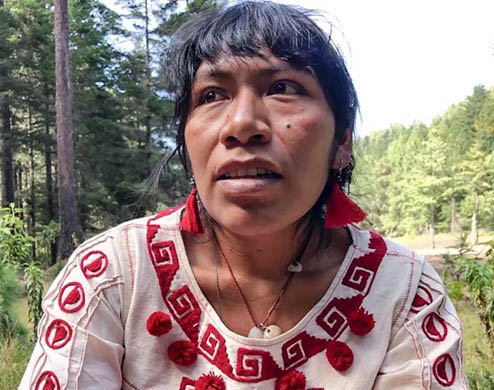|
|
|
|
The weekly newsletter of the México Solidarity Project |
|
|
|
November 17, 2021/ This week's issue/ Meizhu Lui, for the editorial team |
|
|
“Ducks in a Row,” Kristina Kruchowski |
|
Corporate ‘Nationhood’: The Menacing Climate Threat |
|
If it walks like a duck and it quacks like a duck, it’s a duck. Except in the United States, where corporations that don’t walk like any real live person or talk like one get treated — under the law — as if they were a person. Every incorporated U.S. business enjoys all the individual rights of flesh-and-blood people.
And if that doesn’t raise your temperature high enough to threaten climate change, how about this: Under current global “free trade” agreements, our giant corporations also get treated as the equal of nations. These agreements, Manuel Perez-Rocha explains in our interview this week, give corporations the legal power to sue — for billions of dollars in “estimated” losses — real nations that seek to protect their people and their environment.
These lawsuits don’t just rob public treasuries of resources that could serve the public good. These suits also hold back progress on combating climate change. All around the world, people — of the flesh-and-blood variety — are fighting to stop the destruction and contamination of their land, water, and air. In many indigenous communities, these activists are facing murderous attacks from those who benefit from corporate contracts and kickbacks. Governments that dare side with the resisters and move to stop corporate environmental assaults must face the risk of having to pay corporations for their “losses.”
In short, for corporations that put profit over planet, “heads I win, tails you lose."
The current US-México-Canada trade pact continues to allow US and Canadian extractive industries to extort a México willing to stand up for its people. We need to eliminate this corporate weapon of mass destruction from the USMCA and multitudes of other trade agreements. Until that elimination, real people and real nations will not be able to design real solutions to save our planet. Time to get our ducks in a row. |
|
|
|
Don’t miss an issue. Subscribe to the weekly México Solidarity Bulletin! |
|
|
|
|
Manuel Pérez-Rocha, an Institute for Policy Studies associate fellow in Washington and a Transnational Institute associate in Amsterdam, has been a leader in efforts to promote just and sustainable approaches to trade and investment agreements. A dual Mexican and US citizen, Pérez-Rocha has co-edited the comprehensive 2019 analysis, Beyond NAFTA 2.0, and, most recently, Transnational Corporations and Free Trade in México. He writes regularly for the Mexican daily La Jornada.
Under free trade agreements like NAFTA, foreign companies have decimated whole sectors of local economies, like corn production in México. But these pacts, you note, can also decimate national treasuries. |
|
|
Manuel Perez-Rocha: Investor-State Dispute Settlement provisions let corporations sue countries for actions that allegedly reduce the value of their corporate investments. These ISDS lawsuits bypass national public courts and go directly to private supranational tribunals. I don’t say “international” here because the ISDS process doesn’t have nations interacting with each other. The most commonly used tribunal, hosted by the World Bank, has three judges picked from a roster of corporate lawyers, most from the US or Europe.
How does the Investor-State Dispute Settlement process impact climate change?
The climate may be warming, but the ISDS is putting a “chilling” effect on governments that want to enact policies to slow climate change. In many instances, nations have shelved these policies out of the fear that corporate lawsuits would tear big holes in their national budgets. Oil, gas, and mining companies have over 70 cases pending against nations trying to protect their environments.
US corporations do a hefty share of the suing and have not lost any cases, and the US government, for its part, hasn’t been immune from suits. The best example may be the Keystone Pipeline. President Obama halted the pipeline, after a huge public outcry against it, but then Donald Trump reinstated it. President Biden has since revoked the pipeline permit, but the Canadian company that held the permit is suing the US for $15 billion of our tax dollars. So we have a situation where first we organize to stop a corporate project dangerous to our health, then we may have to pay the corporation that gets stopped.
What industries use ISDS the most? |
|
The extractive industries that do so much environmental damage — oil, gas, and mining — account for 30 percent of the cases registered. This may be an undercount, since many suits go under the radar. |
|
|
|
Graph: ICSID World Bank Group, Damon Vis Dunbar, 2020 |
|
Why have less developed countries like México agreed to trade agreement terms that prioritize foreign corporate interests over the well-being of their people?
The main reason: corruption. We see a revolving door between “free trade” negotiating teams and corporate boards. Many government leaders — former Mexican presidents like Salinas, Zedillo, Fox, Calderón, and Peña-Nieto — haven’t been looking out for their country’s welfare. They signed the trade agreements to benefit themselves.
AMLO signed the USMCA, the successor agreement to NAFTA that preserves ISDS for oil and gas companies, but at the same time re-nationalizes the oil sector. What’s up?
AMLO isn’t looking to join a corporate board, but he made a big mistake letting ISDS stay in the USMCA. Lots of confusing contradictions here: AMLO talks tough on energy sovereignty but seems soft — even enthusiastic! — on free trade agreements. He’s left the door open to suits that threaten his treasury and his domestic programs. México is already facing $6 to $8 billion in pending corporate claims. But AMLO doesn’t seem aware of the problems.
How can we strengthen the alliance of all those concerned about our planet’s future?
Environmental activists need to be aware of the dangers of ISDS and other trade and investment rules. These rules could undermine commitments made at COP26 and shield corporations that pollute and destroy entire ecosystems. |
|
The IDS rules give people at risk zero voice. In a current case before the World Bank tribunal, the US company Odyssey-Marine wanted a permit for an underwater mining project off the coast of Baja California. Drilling would destroy the local, fishing-based economy and pollute the area’s ocean and shore. Odyssey-Marine, after not getting its permit, filed suit against México — for $3.5 billion! |
|
|
The Center for International Environmental Law and a fishing co-op have filed an amicus brief in the case. But the World Bank tribunal has the choice not to even consider the brief. Still, victory hasn’t yet become impossible. Look what happened in El Salvador.
Activists there put together an unlikely coalition that included parties that fought on opposite sides of their civil war. They passed a national ban on gold and metal mining that would have poisoned their water supply. And, against all odds, they defeated the Pacific Rim mining company in an ISDS case. What the Salvadorans all realized: Water will always be more valuable than gold. |
|
|
A Mixtec forest defender in Oaxaca disappears |
|
A leading defender of the Ñuu Savi forest, Irma Galindo Barrios, has disappeared, and feminist collectives and social organizations are noting that her life has been in danger since she began organizing against the talamontes — tree cutters — in her municipality. We have more from a news report filed last week by Diana Manzo.
The 41-year-old environmentalist was last seen on October 27 in the communities of Mier and Terán in the municipality of Atatlahuaca, in Oaxaca’s Mixtec region… |
|
|
Public officials have been harassing Irma since 2018 for her defense of the forests in the San Esteban Atatlahuaca municipality and for her condemnation of logging before the Secretary of the Environment and Natural Resources. She has faced persecution, defamation, and even death threats.
On November 10, 2019, her house was burned down, which forced her to live in hiding for several days. On that same day, 10 more houses in her community were burnt. Irma claimed that the municipal president and local authorities were responsible.
On October 23 of this year, as result of armed attacks in the villages of San Esteban Atatlahauca, hundreds of villagers abandoned their homes and dozens of children, women, and older people were forced to live in an improvised camp in the community of Mier Terán y Ndoyonunyuji.
The official Human Rights Defense Organization for the People of Oaxaca has requested an investigation, calling defenders of human rights essential people whose work gives voice to “historically invisible” people. These people — such as Irma — will continue to confront dangerous situations created by invested political and economic interests. |
|
|
Recent news reports and commentaries, from progressive and mainstream media,
Monique Beals, Mexican president calls on world's richest people, companies to fund $1T program to fight poverty, The Hill. AMLO told the UN General Assembly that the $1 trillion would “ensure the right to a decent life for 750 million people who survive on less than two dollars a day.”
Border reopens to tourism, but asylum seekers are left out, Border/Lines. Border communities have rejoiced at the resumption of what has long been a unique way of cross-cultural life, but U.S. restrictions haven’t been lifted on the entry of asylum seekers.
Mexican president blasts Spanish energy companies, La Prensa Latina Spanish energy firms, AMLO is charging, took advantage of deregulation under his predecessor to carry out a “second economic conquest” of México.
Nacha Cattan, US Labor Shortage Gives Mexico Munition for Migrant Visa Plan, Bloomberg. AMLO wants the US to accept between 600,000 and 800,000 Mexicans and Central Americans annually for a guest worker plan.
Lisa Viscidi y MK Vereen, México puede limpiar su obsoleta industria energética, New York Times. En América Latina hay empresas energéticas estatales que están haciendo más para abordar el cambio climático. |
|
|
The Mexico Solidarity Project brings together activists from various socialist and left organizations and individuals committed to worker and global justice who see the 2018 election of Andrés Manuel López Obrador as president of México as a watershed moment. AMLO and his progressive Morena party aim to end generations of corruption, impoverishment, and subservience to US interests. Our Project supports not just Morena, but all Mexicans struggling for basic rights, and opposes US efforts to undermine organizing and México’s national sovereignty.
Editorial committee: Meizhu Lui, Bruce Hobson, Bill Gallegos, Sam Pizzigati. We welcome your suggestions and feedback. Interested in getting involved? Drop us an email! |
|
|
|
Web page and application support for the México Solidarity Project from NOVA Web Development, a democratically run, worker-owned and operated cooperative focused on developing free software tools for progressive organizations. |










